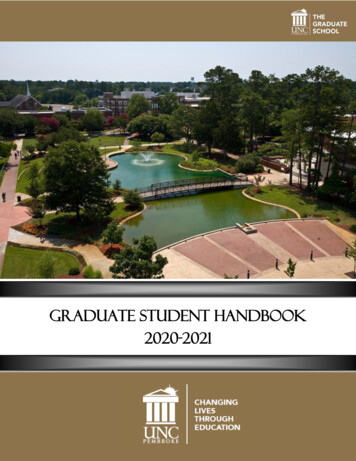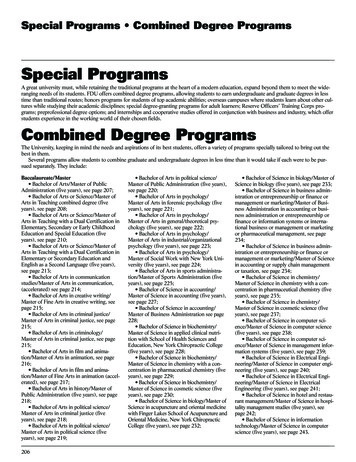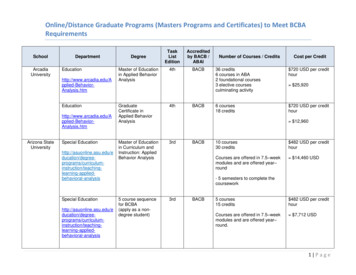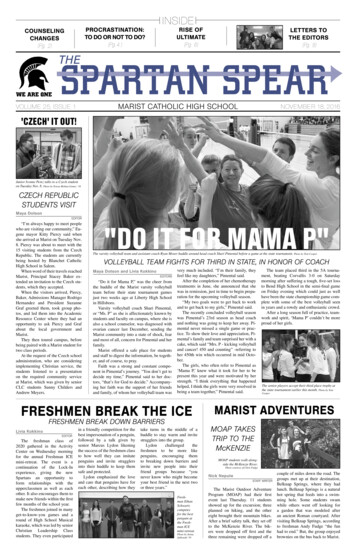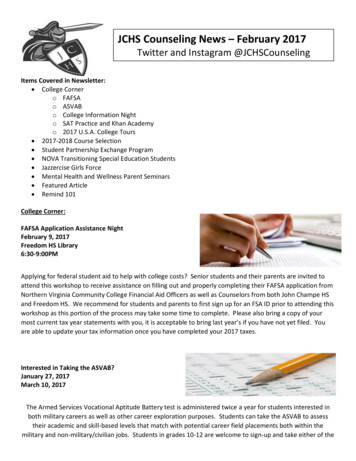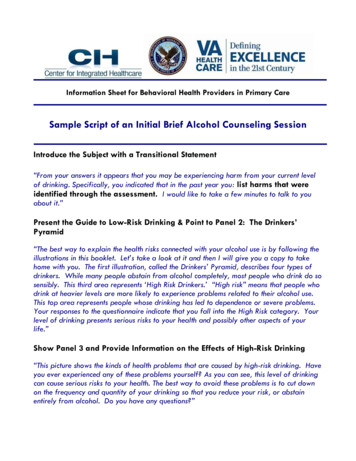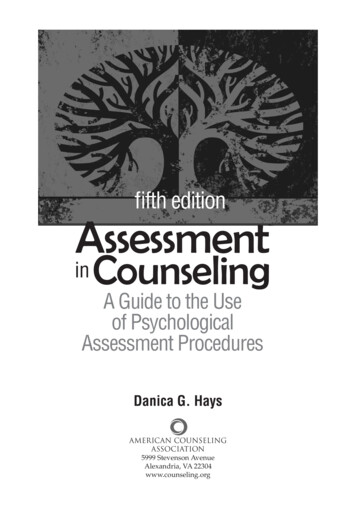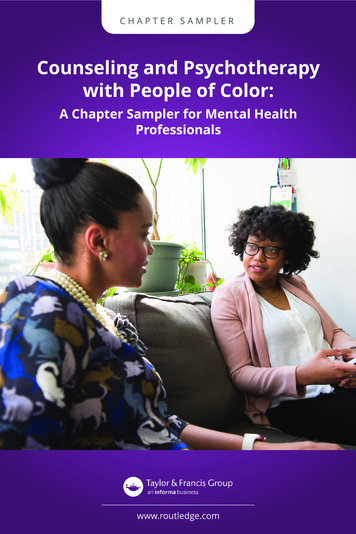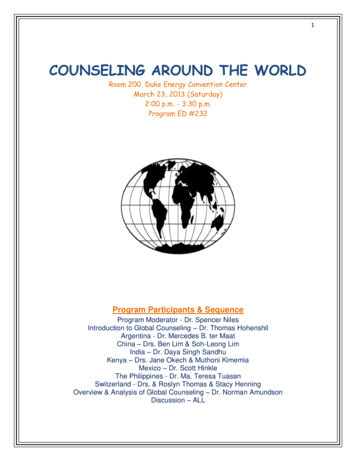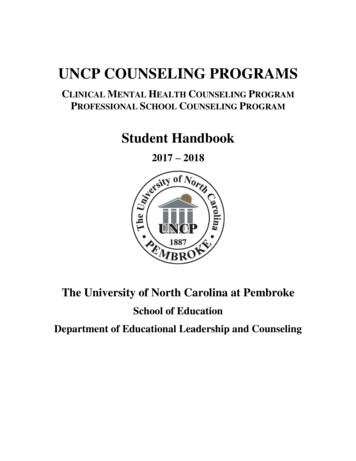
Transcription
UNCP COUNSELING PROGRAMSCLINICAL MENTAL HEALTH COUNSELING PROGRAMPROFESSIONAL SCHOOL COUNSELING PROGRAMStudent Handbook2017 – 2018The University of North Carolina at PembrokeSchool of EducationDepartment of Educational Leadership and Counseling
School of EducationP.O. Box 1510Pembroke, NC 28372-1510910-521-6221AugustAugust 28, 2017Dear Student,As Program Directors of the Professional School Counseling Program and the ClinicalMental Health Counseling Program, let us extend a warm welcome to you on behalf ofthe faculty and staff of the School of Education, Department of Educational Leadershipand Counseling, and UNCP!Professional Counseling is an exciting career field that offers many rewardingopportunities for personal and professional development. As you work towards becominga Professional Counselor in a school or clinical mental health setting, please takeadvantage of the many opportunities available to you, on and off campus, which will helpfulfill your academic and professional goals.This handbook is meant to serve as your roadmap to UNCP’s Counseling Programs. Itprovides information about each program of study and requisite field placementexperiences – practicum and internship. Consult this handbook, UNCP AcademicCatalog, The School of Graduate School, and your academic advisor often to ensuresuccessful progression through your chosen program of study. We also encourage you tobecome active in professional organizations such as the American CounselingAssociation (ACA) and the North Carolina Counseling Association (NCCA).There are several ways to keep up to date with the Counseling Program: follow our blog: t with us on Twitter: @UNCPCounselorEdlike us on Facebook: in the email /uncpcounselingprograms (if on campus)The Counseling Programs at UNCP are committed to excellence in counselor preparationand we welcome feedback about your program experience. If we can be of anyassistance, please do not hesitate to contact us.Cordially,Ki Chae, PhDShenika Jones, PhDProgram DirectorProgram DirectorClinical Mental Health CounselingProfessional School CounselingDepartment of Educational Leadership and Counseling2 Counseling Programs Student Handbook 2017-2018Chae 8/28/17
Table of ContentsTHE COUNSELING PROGRAMS AT UNCP5HISTORY OF THE COUNSELING PROGRAMS AT UNCPMISSION OF THE UNIVERSITYORGANIZATIONAL STRUCTURE AND PHYSICAL LOCATION566MEET THE FACULTY7PROGRAM POLICIES AND PROCEDURES11CLINICAL MENTAL HEALTH COUNSELING PROGRAM DESCRIPTIONPROFESSIONAL SCHOOL COUNSELING PROGRAM DESCRIPTIONSCHOOL COUNSELING LICENSURE ONLY STUDENTSCERTIFICATE PROGRAMCOURSE DELIVERYADMISSION REQUIREMENTSNON-DEGREE SEEKING STUDENTSTRANSFER CREDITSAPPLICANTS AND STUDENTS WITH CRIMINAL CONVICTIONSSTUDENT DIVERSITY POLICYGRADUATE ASSISTANSHIP OPPORTUNITIESPROGRAM ORIENTATIONADVISEMENTGRADUATE STUDENT HANDBOOKACADEMIC CALENDARSSTUDENT EXPENSESETHICAL CONDUCTPERSONAL COUNSELINGEMAIL POLICYCOUNSELING PROGRAMS LISTSERV, BLOG, TWITTER, FACEBOOK AND INSTAGRAMPROFESSIONAL MEMBERSHIPSCHI SIGMA IOTA CHAPTER: PHI SIGMAANNUAL 2223STUDENT PROGRESS AND ASSESSMENT24COURSE SEQUENCINGSTUDENT LEARNING OUTCOMESEVALUATION AND ASSESSMENT PROCEDURESCOURSE GRADESCOUNSELING PROGRAMS GRADING POLICYSCHOOL OF GRADUATE STUDIES GRADING POLICYCOMPREHENSIVE EXAMNATIONAL COUNSELOR EXAMINATIONSTUDENT PROGRESS EVALUATIONAPPLICATION TO AND ENROLLMENT IN CNS 6100 COUNSELING PRACTICUMASSESSMENT DURING INTERNSHIPDISPOSITION PROTOCOL & REMEDIATION PROCEDURESUNCP GRIEVANCE PROCEDURES AND POLICIESCOUNSELOR LICENSURE AND CERTIFICATION24252627272728303030303134343 Counseling Programs Student Handbook 2017-2018Chae 8/28/17
LETTERS OF RECOMMENDATION FOR EMPLOYMENT, ADVANCED STUDIES, AND CREDENTIALING35PROGRAM EVALUATION35FIELD PLACEMENT POLICIES & PROCEDURES36FIELD PLACEMENT AND TESTING COORDINATORCNS 6100 COUNSELING PRACTICUM (3 HOURS)COUNSELING INTERNSHIPFIELD EXPERIENCE PLACEMENT PROTOCOL FOR ALL COUNSELING STUDENTSLIABILITY INSURANCEPROFESSIONAL DISCLOSURE STATEMENTRECORDING COUNSELING SESSIONS36363737383940APPENDIX44CURRICULUM: COURSE DESCRIPTIONS444 Counseling Programs Student Handbook 2017-2018Chae 8/28/17
THE COUNSELING PROGRAMS AT UNCPThis student handbook contains general and program specific information about the twoCACREP accredited counseling degree programs offered at UNCP: Clinical MentalHealth Counseling and Professional School Counseling. The information in thishandbook is subject to change periodically, and students should be sure to consult withtheir advisors throughout their program of study for updated information. In addition, thecounseling program faculty encourages students to frequently consult the policies of theSchool of Graduate School, UNCP academic calendars, and UNCP Academic Catalogavailable at: http:/www.uncp.edu.History of the Counseling Programs at UNCPThe Counseling Programs at UNCP have been training and preparing counselors to workin the schools and communities of Southeastern North Carolina since the mid-1990s. TheCounseling Programs began as two graduate degree programs: a Master of Arts in SchoolCounseling and a Master of Arts in Service Agency Counseling and were among the firstprograms to be included in what was then known as Pembroke State University’sgraduate degree programs. Enrollment for both programs began in the fall of 1994. Theprogram was originally housed under the Psychology Department within the College ofArts & Sciences; however, over time, the programs were relocated to the School ofEducation and the Professional School Counseling Program was formally recognized as aprogram within Teacher Education.From 2005-2008, each Counseling Program taught distinct and separate core counselingcourses. In 2008, counseling program faculty revised each program’s curriculum toreflect a shared vision that emphasized cohesive counselor education identity, commoncore coursework, and mission to prepare excellent counselors. In 2009, the ServiceAgency Counseling Program was phased out and replaced with a comprehensive 60credit hour Clinical Mental Health Counseling Program that included coursework specificto mental health counseling issues and an additional semester of internship experience tototal 700 hours of field placement experience upon graduation.During the fall of 2010, the counseling programs began a formal process of self-studyprocess as the department prepared to pursue accreditation with the Council for theAccreditation of Counseling and Related Education Programs (CACREP). The self-studyprompted numerous program improvements including, but not limited to, increasing therequired number of credit hours for the Professional School Counseling degree from 48to 60 credit hours and focusing on student learning outcomes for assessment across bothcurricula. The self-study was submitted to CACREP in December 2011 and a site visitwas conducted in October 2012. The counseling programs received a two-year CACREPaccreditation in January 2013. In January 2015, CACREP extended the accreditation toMarch 2021.The CACREP standards, state licensure standards, faculty expertise, student feedback,and unique needs of the region have provided valuable, ongoing sources of programdevelopment inspiration. To date, both counseling programs remain accredited byCACREP. Additionally, the Professional School Counseling Program is accredited by5 Counseling Programs Student Handbook 2017-2018Chae 8/28/17
the National Council for Accreditation of Teacher Education (NCATE) and approved bythe NC Department of Public Instruction (NCDPI).Mission of the UniversityFounded in 1887 as a school for the education of American Indians, UNCP now serves adistinctly diverse student body and encourages inclusion and appreciation for the valuesof all people. UNCP exists to promote excellence in teaching and learning, at thegraduate and undergraduate levels, in an environment of free inquiry, interdisciplinarycollaboration, and rigorous intellectual standards.Our diversity and our commitment to personalized teaching uniquely prepare our studentsfor rewarding careers, postgraduate education, leadership roles, and fulfilling lives. Wecultivate an international perspective, rooted in our service to and appreciation of ourmulti-ethnic regional society, which prepares citizens for engagement in global society.Students are encouraged to participate in activities that develop their intellectual curiosityand mold them into responsible stewards of the world.UNCP faculty and staff are dedicated to active student learning, engaged scholarship,high academic standards, creative activity, and public service. We celebrate our heritageas we enhance the intellectual, cultural, economic, and social life of the region.Mission of the Counseling ProgramsThe mission of the Graduate Counseling Programs at the University of North Carolina atPembroke is to train diverse professional counselors committed to improving the mentalhealth and human development of individuals served in schools and communities.Through research, service, and teaching, the faculty members collaborate with students toprepare counseling practitioners who have strong counselor identities, effective clinicaland leadership skills, and cultural competence. The counseling programs engage incontinual program evaluation and revision to maintain alignment with the TeacherEducation Program, state licensure requirements and standards, as well as the counselingprofession’s national standards.Organizational Structure and Physical LocationThe counseling programs are located under the Department of Educational Leadershipand Counseling within the School of Education located in the Education Center building.The Dean of the School of Education is Dr. Alfred Bryant and the Associate Dean is Dr.Angela McDonald. Dr. Jeffrey Warren is the Chair of the Department of EducationalLeadership and Counseling. Dr. Ki Chae is the Program Director of the Clinical MentalHealth Counseling Program. Dr. Shenika Jones is the Program Director of theProfessional School Counseling Program. Dr. Nicole Stargell is the Field Placement andTesting Coordinator.All programs that offer graduate degrees at UNCP are coordinated by The GraduateSchool located in Lindsay Hall. The Graduate School sets university-wide policies andprocedures for graduate programs.6 Counseling Programs Student Handbook 2017-2018Chae 8/28/17
MEET THE FACULTYThe core and supporting faculty of the UNCP Counseling Programs are listed inalphabetical order below. Core faculty teaches classes and advises students during theFall and Spring semesters, and on a limited basis during Summer semesters.Whitney P. Akers, PhD, NCC, LPCA, ACS is an Assistant Professor in the Departmentof Educational Leadership and Counseling. She completed her doctoral work inCounseling and Counselor Education with a cognate in Women’s and Gender Studies atthe University of North Carolina at Greensboro. She also earned a MS/EdS in Couple andFamily Counseling and School Counseling at UNC-Greensboro and a BA in Psychologyand Sexuality Studies at UNC-Chapel Hill. Her research interests center on the ways inwhich people who identify as LGBTQ experience outness and how intersections ofqueerness and race, class, ability, spirituality, and ethnicity influence mental health andwellness. She is also interested in how these intersectional lived-experiences are impactedby the current political climate in terms of access, perceived levels of safety, and identitypride. Recently, her related passion for examining ethical research practices facilitatedher collaboration with a team of counselors affiliated with ALGBTIC and AARC tocreate standards for assessment and research with LGBTQ populations. She is aNationally Certified Counselor and an Approved Clinical Supervisor. Her clinicalexperience includes counseling in community agency, inpatient, spiritual care,hospital/integrated care, detention center, school, and private practice settings. Embeddedwithin her clinical work is a deep dedication to and passion for social justice andadvocacy. In her daily life, this passion extends to challenging the social construction ofpower through feminist ideology, art, performance, and activism. Whitney lives joyfullywith her wife, Victoria, in Greensboro, NC.Contact information: Email: whitney.akers@uncp.eduAlfred Bryant, PhD, LPC is Professor in the Department of Educational Leadership andCounseling and the Dean of the School of Education. He is also the Founding Director ofthe Southeast American Indian Studies (SAIS) Program. Dr. Bryant completed hisdoctoral work in Counselor Education with a minor in Multicultural Counseling at NorthCarolina State University. His research and scholarship focuses on racial identitydevelopment, multicultural counseling and cultural differences in parental emotionalcommunication. He is a member of the American Counseling Association and theAssociation for Counselor Education and Supervision. He is a Licensed ProfessionalCounselor with experience in community settings and schools.Contact information: Email: alfred.bryant@uncp.eduKi Chae, PhD, LPCA, NCC is an Assistant Professor in the Department of EducationalLeadership and Counseling. He completed his doctoral work in Counselor Education andSupervision with a cognate in family counseling at the College of William and Mary inWilliamsburg, VA. His research and clinical interests focuses on assessment, clinicalsupervision, multicultural issues in counseling, psychological issues of immigrants andtheir families, and global perspective in counselor education. He is a member of theAmerican Counseling Association and the Association for Counselor Education and7 Counseling Programs Student Handbook 2017-2018Chae 8/28/17
Supervision. Dr. Chae resides in Fayetteville, NC with his wife, two daughters, and ason.Contact information: Email: kibyung.chae@uncp.eduShenika J. Jones, PhD, LPCA is an Assistant Professor in the Department ofEducational Leadership and Counseling and director of the Professional SchoolCounseling Program. Dr. Jones earned her PhD from the University of North Carolina atCharlotte. Her research and teaching interests include multicultural competency, socialjustice advocacy, and counseling children and adolescents. She is a licensed schoolcounselor with extensive practice in Child-Centered Play Therapy. Most of herexperience has been in school settings; however, she has also served as a counselor in aprivate practice and hospital setting in Charlotte, NC during her doctoral studies. Dr.Jones has presented at the state, regional, and national level. Dr. Jones resides in herhometown of Dillon, SC with her son, Evan.Contact information: Email: shenika.jones@uncp.eduAngela McDonald, PhD, LPCS, NCC is an Associate Professor in the Department ofEducational Leadership and Counseling and the Associate Dean for the School ofEducation. She is the current President for the American Association of State Boards ofCounseling. Dr. McDonald completed her doctoral work in Counselor Education with acognate in family counseling at the College of William and Mary in Williamsburg, VA.Prior to joining the faculty at UNCP, she counseled college students and taught as anadjunct instructor at East Carolina University. Her current research, scholarship, andclinical interests focus on mental health policy, counseling licensure and accreditationissues. She has served as a counselor in a women’s health clinic, at a substance abusecommunity agency, in a family counseling clinic, on a college campus, and in a privatepractice. Dr. McDonald lives in Wagram, NC with her husband and three daughters.Contact information: Email: angela.mcdonald@uncp.eduGary W. Mauk, PhD, NCSP is an Associate Professor in the School of Education andteaches full time in the Counseling Programs. Dr. Mauk completed his doctoral work inPsychology (child–adolescent development) at Utah State University in Logan, UT. Healso holds a MA and CAGS in Developmental Psychology and School Psychology,respectively, from Gallaudet University in Washington, DC. He also holds theNationally Certified School Psychologist (NCSP) credential issued by the NationalSchool Psychology Certification Board. Prior to joining the School of Education faculty,Dr. Mauk held the following positions: Coordinator of Grants Development in the UNCPOffice of Sponsored Research and Programs; Senior Research and Evaluation Consultantand Funding Acquisition Specialist at Spectrum Consulting (Utah); research projectcoordinator/grant proposal developer at the National Center for Hearing Assessment andManagement (NCHAM) and research and evaluation consultant/grant proposal developerat the SKI–HI Institute at Utah State University; and school psychologist in Utah andNorth Carolina (Scotland County and Moore County). His research and scholarship hasfocused on earlier identification of hearing loss and early intervention services, as well aschild and adolescent mental health issues, especially loss and grief. He is a member ofthe National Association of School Psychologists (NASP), the North Carolina School8 Counseling Programs Student Handbook 2017-2018Chae 8/28/17
Psychology Association (NCSPA), and the North Carolina Counseling Association(NCCA). Dr. Mauk engages in grant development consultation within the School ofEducation and with regional school districts, and, when time permits, he enjoys listeningto 1970s-era music and playing with his dog, Sadie.Contact information: Email: gary.mauk@uncp.eduJonathan R. Ricks, PhD, LPC, NCC is an Assistant Professor in the Department ofEducational Leadership and Counseling. Jonathan completed his doctoral work inCounseling and Counselor Education with a cognate in Instructional Technology at NorthCarolina State University. He earned a Master of Arts in School Counseling from NorthCarolina Central University. Jonathan has served as a school counselor in North Carolinafor seven years and worked as a college advisor and counselor for four years. Hisresearch interests include the preparation of school counselors, evidence-based schoolcounseling practice, and first-generation college students.Contact information: Email: jonathan.ricks@uncp.eduNicole A. Stargell, PhD, LPC, NCC is an Assistant Professor in the Department ofEducational Leadership and Counseling. She serves as the Field Placement and TestingCoordinator for the counseling programs and Chapter Faculty Advisor of the Phi SigmaChapter of Chi Sigma Iota. Dr. Stargell is a Licensed Professional Counselor andLicensed School Counselor, as well as a Nationally Certified Counselor. Her specialty iscounseling children and adolescents, and she also works with grief and loss issues.Contact information: Email: nicole.stargell@uncp.eduDana Unger, PhD, NCC is an Assistant Professor in the Department of EducationalLeadership and Counseling. She also serves as co-advisor for the Phi Sigma Chapter ofChi Sigma Iota (CSI). Dr. Unger earned her PhD in Counselor Education andSupervision from Kent State University. Before attending Kent State, Dr. Unger was bothan elementary and secondary school counselor in Nevada. Her research interests includeschool counselor identity, advocacy, and job satisfaction as well as the relationshipbetween school counselors and administrators. Dr. Unger is a member of the AmericanSchool Counselor Association (ASCA), American Counseling Association (ACA), andthe Association for Counselor Education and Supervision (ACES).Contact information: Email: dana.unger@uncp.eduJeffrey M. Warren, PhD, LPCS, NCC, NCSC is an Associate Professor and chair ofthe Department of Educational Leadership and Counseling. Jeff completed his doctoralwork in Counselor Education and Supervision with a cognate in Education at NorthCarolina State University. He has worked as a p
Counseling and Counselor Education with a cognate in Women’s and Gender Studies at the University of North Carolina at Greensboro. She also earned a MS/EdS in Couple and Family Counseling and School Counseling at UNC-Greensboro and a BA in Psychology and Sexuality Studies at UNC-
